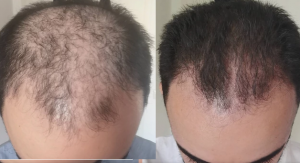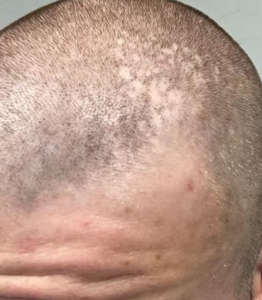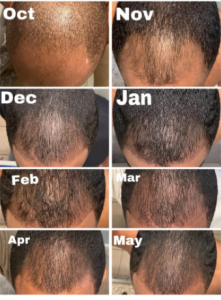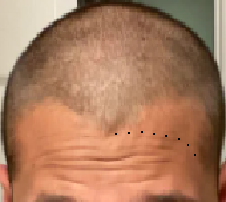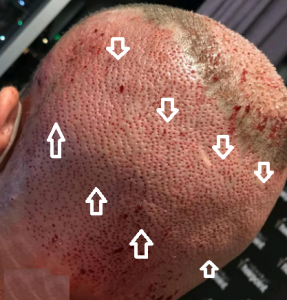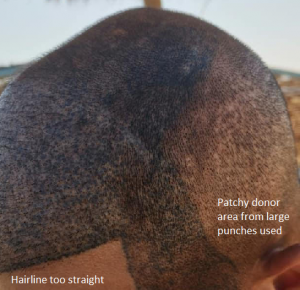Post finasteride syndrome is reported between 0.1 – 1% and some reports are higher. In my practice and in the practice of a dozen other doctor who, combined, easily have written prescriptions for over 200,000 young men, have not seen PFS because when sexual side effects happen, we stop the medications. Look at this link: https://baldingblog.com/finasteride-what-are-the-real-sexual-side-effects/
Hair brings back confidence and it is self-confidence that makes men more attractive to women.
I was curious if you believe in testosterone itself causing hair loss and this being raised by finasteride and dutasteride can worse things for some people? I got diagnosed with a folate deficiency, but addressing it the past two months doesn’t seem to have helped, so I’m wondering if this could be the case.
Exogenous testosterone can cause hair loss in men with the genes for hair loss and as testosterone goes up, so does the amount of DHT found in your body
For how long should a guy under 25 expect fin to work?
Finasteride will work as long as your take it; however, by work I mean slowing the loss down, stopping it or reversing it (usually temporary for months or years).
Thank you for your answer. I’ve heard it’s 80% as effective as the regular dose, would you say that estimate is correct? I’ve been taking that dose for a year because I was concerned about sides and my doctor prescribed it that way, however I feel like my hair is not improving. I also take minoxidil once a day and I think the loss has stopped or almost, but nothing more than that. I just turned 25
What is the dose you are discussing? Look at this curve: https://baldingblog.com/finasteride-competes-with-dht-at-the-receptor-graphic/ You can see that half the dose is almost as effective as the full dose and 1/4 of the dose is about 50% as effective as the full dose
Do you know if having Pseudogynecomastia will make you predisposed to developing gynecomastia as a side effect from finasteride?
Pseudogynecomastia means that there is extra fat in the breast area of a man. It should not increase the risk with finasteride bringing on Gynecomastia
Just one pill a day should reverse this very deforming disease. It is coming out of clinical trials now, see here: https://www.biospace.com/article/pfizer-announces-positive-top-line-results-from-phase-2b-3-trial-of-ritlecitinib-in-alopecia-areata/
Often, men achieve their genetic inherited pattern of hair loss and then stop losing hair. To judge if this is the end point, go back and see if your hair loss pattern has been stable for the past 5 years and if so, this means that you might have reached your inherited hair loss pattern by now
I drew in the juvenile hairline (see fine dots on the right side of the picture) that would have been his hairline when he was 5 years old. Note that the hairline moves upward as maturing occur. This man has a widow’s peak which shows the lowest position of the juvenile hairline. Young children of both sexes have a concave hairline and as they get older, most men lose it while some women keep it. Read this for more details: https://newhair.com/wp-content/uploads/2018/11/phenotype-article-published.pdf
This is a terrible example of someone performing and FUE and not understanding the basics of moving only permanent hair from the donor zone. I have marked the donor area which is a 3 inch high area starting at the based of the skull between the arrows I drew. Not only will a good 50% of the hairs eventually fall out that were transplanted leaving the patient to experience balding again, but when they fall out, white FUE donor scars will appear all over the non-permanent zone. This procedure was done in Turkey by technicians or a doctor who didn’t understand the FUE process.
I don’t believe that this man who thought he had good work done will be happy with these results. His hairline is straight (no hairline is straight) and the donor area has a large number of patchy areas reflective of a surgeon who used a large punch to perform the FUE. This is a post-operative photo (possibly 1-2 weeks after the surgery) with a lot of scabs sill on the recipient area. The man posted this photo on a forum, but he was proud of it. Detectable hair transplants are never good and this man shows the transplant with an abnormal perfectly straight frontal hairline with straight temple peaks and a see-through donor area from possibly too many FUEs taken for harvesting his donor area. It would have been nice if this man posted a better photo.
What in your opinion would be the ideal needle depth and frequency? Every two weeks?
I am not an expert on microneedling; however, it makes sense that needle depth should be 1-1.5 mm to reach through the epidermis and impact the stem cells which are found high in the dermis. The frequency is purely an intellectual guess. I am seeing that many of the Reddit posters are doing it weekly which sounds ok to me. I am certain that once a hair cycle has passed, the growth from microneedling will be undone unless more microneedling is performed.

